|
|
|
Sort Order |
|
|
|
Items / Page
|
|
|
|
|
|
|
| Srl | Item |
| 1 |
ID:
140001
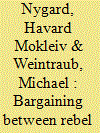

|
|
|
|
|
| Summary/Abstract |
Although military cooperation among rebel groups in multi-party civil wars could help rebels defeat or extract concessions from an incumbent government, violent conflict among rebel groups is empirically prevalent. Why do rebel groups in multi-party civil wars choose to fight one another? This article models the strategic dilemma facing rebel groups in multi-party civil wars as an alternating-offer bargaining game of incomplete information with an outside option. The game-theoretic model explores the relationship between the status quo distribution of power among rebel groups, the costs of fighting, and the likelihood that one rebel group will opt to unilaterally end bargaining over a set of goods, such as access to supply routes, natural resources, and control over civilian populations. We show that the likelihood of violent conflict between rebel groups is lowest when the status quo distribution of benefits reflects the existing distribution of power.
|
|
|
|
|
|
|
|
|
|
|
|
|
|
|
|
| 2 |
ID:
077132
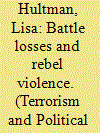

|
|
|
|
|
| Publication |
2007.
|
| Summary/Abstract |
In many armed conflicts, rebel groups deliberately target civilians. This article examines whether such violence is related to the performance of the rebels on the battlefield. It is proposed that rebel groups who are losing battles target civilians in order to impose extra costs on the government. When rebels attack civilians, the government may incur both political and military costs. Violence against civilians is thus used as an alternative conflict strategy aimed at pressuring the government into concessions. The argument is evaluated by using monthly data for rebel groups involved in armed conflict from January 2002 to December 2004.
|
|
|
|
|
|
|
|
|
|
|
|
|
|
|
|
| 3 |
ID:
161538
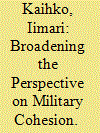

|
|
|
|
|
| Summary/Abstract |
It is difficult to underestimate the importance of cohesion for armed groups or organizations specialized and engaged in organized violence. This article argues that the recent debate on military cohesion has been far too narrow as it focused on Western state militaries during the 20th and 21st centuries, and even then only on the microlevel. It is necessary to broaden the perspective in order to construct theories that encompass even the vast majority of armed groups—the non-Western, nonstate, and nonmodern. This article advocates two ways of doing so: the investigation of cases that belong to these three types and broadening analysis to two new levels of analysis—the meso-level of armed groups and the macro-level, which contains state and society. Cohesion is established through harmonizing these three levels, which necessitates including them in the analysis in the first place.
|
|
|
|
|
|
|
|
|
|
|
|
|
|
|
|
| 4 |
ID:
173130


|
|
|
|
|
| Summary/Abstract |
To what extent does sexual violence influence rebel group fragmentation? A substantial body of research explores wartime rape as a cohesion-building mechanism following forced recruitment. However, the relationship between sexual violence and broader organizational structural integrity has not been systematically tested. Our study on the effects of sexual violence on rebel group fragmentation provides this test. We argue that sexual violence increases cohesion at the battalion level but increases the risk of fragmentation of the broader organization because lieutenants are more likely to split from organizations if they are confident that their subordinate battalions are cohesive and will follow them. We test this argument on a global sample of 105 rebel organizations active between 1989 and 2014. The results provide robust support for the argument showing sexual violence increases the probability of fragmentation by a factor of six. This presents a crucial contribution to our understanding of sexual violence and rebel group fragmentation.
|
|
|
|
|
|
|
|
|
|
|
|
|
|
|
|
| 5 |
ID:
165664
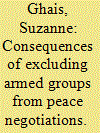

|
|
|
|
|
| Summary/Abstract |
This article examines the relationship between inclusion/exclusion of armed groups and the achievement of durable peace, using process tracing in two case studies: the peace process between the government of Chad and the rebel group Movement for Democracy and Justice in Chad, and the one between the government of the Philippines and the Moro National Liberation Front. The cases support theoretical arguments that excluded armed actors are more likely to renew armed confrontation after the peace accord. The study further elaborates the causal link: included armed rebels tend to negotiate for private benefits such as government posts and amnesty but also moderate their stances and emerge committed to the agreement; excluded armed actors lack any such commitment and still have unresolved grievances. They are thus more likely to renew armed action against the government.
|
|
|
|
|
|
|
|
|
|
|
|
|
|
|
|
| 6 |
ID:
193100
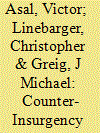

|
|
|
|
|
| Summary/Abstract |
International attacks by rebel groups are an historically important phenomenon. Yet, few scholars have sought to understand why some rebel organizations “go abroad” and commence international attacks and some do not. We theorize that a rebel group’s decision to attack internationally is partly the result of its home-state’s counter-insurgency strategy. Home-states that employ broad-based repression discourage rebels from engaging in international attacks. By contrast, home-states that employ narrowly targeted repression accelerate rebel decisions to attack internationally. Finally, concessions by the home-state are a sufficient condition for the rebel groups in our data to never attack internationally.
|
|
|
|
|
|
|
|
|
|
|
|
|
|
|
|
| 7 |
ID:
188328
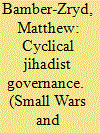

|
|
|
|
|
| Summary/Abstract |
The rise and decline of the Islamic State’s (IS) caliphate between 2014 and 2018 have garnered significant policy and academic attention. Explanations for the group’s territorial demise have focussed on its internal group dynamics and external conflict processes. Although both explanations are valid, I adopt a historical approach to show that IS’s caliphate was just one cycle in a two-decade history of governance activity. IS has undertaken three governance cycles composed of phases of insurgency, gaining territory, establishing institutions, and losing territory. After each governance cycle, IS engaged in a process of critical self-reflection and adapted its governance strategy significantly. This resulted in a progressive history in which, with each cycle, IS governed greater amounts of territory, through more complex institutions, for a longer period of time. This article is based on fieldwork interviews conducted with both IS members and civilians who lived under IS control in Iraq, Lebanon, Syria, and Turkey, as well as archival research on IS historical and contemporary governing documents.
|
|
|
|
|
|
|
|
|
|
|
|
|
|
|
|
| 8 |
ID:
184190
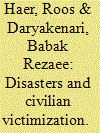

|
|
|
|
|
| Summary/Abstract |
How do natural disasters affect the treatment of civilians by non-state actors? On the one hand, conflict literature argues that adverse shocks influence the strategic interplay between rebel groups and the government, potentially increasing the level of violence against civilians. On the other hand, sociological research on natural disasters argues that they increase social integration and cooperation and are thus expected to reduce the risk of violent behaviour. In this study, we contend that the dynamics of violence against civilians are different in the short term and long term after a disaster strikes. We argue that natural disasters lead to a decrease in violence against civilians perpetrated by rebel groups in the short run. However, over time this temporary improvement in social integration starts to decline, increasing the level of civilian victimization. To examine this potential temporal dynamic, we combine georeferenced information on one-sided violence (Armed Conflict Location & Event Data; ACLED) and data on disasters (Emergency Event Database; EM-DAT). Our results confirm the expected dynamic effects. This research has important implications for our understanding of how disasters can influence the relationship between civilians, rebel groups, and governments.
|
|
|
|
|
|
|
|
|
|
|
|
|
|
|
|
| 9 |
ID:
143321
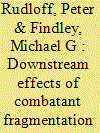

|
|
|
|
|
| Summary/Abstract |
We consider whether the fragmentation of combatants during civil war has downstream effects on the durability of peace following civil wars. We contend that the splintering of combatant groups, a primary manifestation of rebel group fragmentation, produces potential spoiler groups that are neither incidental nor unimportant in the process of civil war resolution. Making connections to the spoiling and credible commitment literatures, we hypothesize that rebel splintering hastens the recurrence of civil wars. Using event history modeling and propensity score matching to analyze two different civil war datasets, we examine whether the occurrence of fragmentation during a civil war influences the length of peace after the civil war. The empirical analysis of fragmentation events during civil wars since World War II offers support for the hypothesis that splintering decreases the duration of post-civil war peace. The results suggest the need to pay closer attention to the dynamics of fragmentation, and particularly how these dynamics lead to future consequences – even when those consequences take place after the war has concluded. For example, governments that attempt to splinter groups or to use existing fragmentations within rebel groups to end a civil war may encourage the unintended consequence of shorter peace duration.
|
|
|
|
|
|
|
|
|
|
|
|
|
|
|
|
| 10 |
ID:
164152
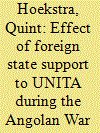

|
|
|
|
|
| Summary/Abstract |
State support for foreign rebel groups has become more salient, yet it remains unclear how this affects armed conflict. This paper therefore analyses the effect of foreign government assistance and does so in the typical case of the Angolan War (1975–1991). It argues that South African and United States support greatly helped the National Union for the Total Independence of Angola (UNITA) wage a large and sustained insurgency campaign but was ultimately insufficient to overthrow the People’s Movement for the Liberation of Angola (MPLA) government because it enabled the incumbent government to obtain similar foreign assistance and because the level of aid awarded to UNITA fluctuated strongly, preventing it from engaging in meaningful long-term planning.
|
|
|
|
|
|
|
|
|
|
|
|
|
|
|
|
| 11 |
ID:
133276


|
|
|
|
|
| Publication |
2014.
|
| Summary/Abstract |
Although some rebel groups work hard to foster collaborative ties with civilians, others engage in egregious abuses and war crimes. We argue that foreign state funding for rebel organizations greatly reduces incentives to "win the hearts and minds" of civilians because it diminishes the need to collect resources from the population. However, unlike other lucrative resources, foreign funding of rebel groups must be understood in principal-agent terms. Some external principals-namely, democracies and states with strong human rights lobbies-are more concerned with atrocities in the conflict zone than others. Multiple state principals also lead to abuse because no single state can effectively restrain the organization. We test these conjectures with new data on foreign support for rebel groups and data on one-sided violence against civilians. Most notably, we find strong evidence that principal characteristics help influence agent actions.
|
|
|
|
|
|
|
|
|
|
|
|
|
|
|
|
| 12 |
ID:
185258
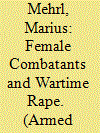

|
|
|
|
|
| Summary/Abstract |
Whereas existing research posits that the presence of female fighters in armed groups decreases their propensity for wartime rape, one recent study tests this claim quantitatively and is unable to detect a statistically significant effect. This leads the author to conclude that female combatants do not decrease rape. Using that study’s original data, this article reexamines the evidence for the relationship between female rebel combatants and wartime sexual violence. Replications of the original models suggest that they make strong functional form assumptions regarding numerous independent variables and time dependence and that relaxing them results in substantively different findings. Namely, women’s participation in armed groups decreases groups’ use of wartime rape. In support of Loken’s organizational theory of rape, results also suggest that this effect is moderated by group norms. These findings contribute to the literature on female participation in rebel groups and beyond.
|
|
|
|
|
|
|
|
|
|
|
|
|
|
|
|
| 13 |
ID:
162456
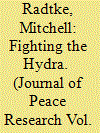

|
|
|
|
|
| Summary/Abstract |
In the past 25 years, the United Nations has sanctioned 28 rebel groups in 13 civil wars. Have the UN sanctions been effective in meeting the goal of conflict reduction? In this article, we argue that UN sanctions are effective to the extent that they can constrain and weaken some rebel groups. But this constraining effect can only occur when UN sanctions curtail rebel groups’ ability to adapt. For less adaptable groups, UN sanctions can trigger a causal chain of depressed rebel income, territorial losses, and battlefield defeats that leads to conflict reduction. This adaptability is the key to the understanding of UN sanctions’ effectiveness in conflict reduction, as rebel groups often engage in illegal and criminal economic activities and many of them are ‘Hydra-like’, being able to shift their income sources in response to sanction measures. As evidence of how UN sanctions can trigger these conflict dynamics, we first perform negative binomial regression on all civil war cases. We then proceed to provide more detailed evidence for our causal chain by conducting time-series intervention analysis on two sanctioned rebel groups: UNITA in Angola and al-Shabaab in Somalia. Our work is the first systematic quantitative analysis of UN sanctions’ effects on rebel groups, and the results have implications for the viability of economic coercion as a means to intervene into civil conflicts.
|
|
|
|
|
|
|
|
|
|
|
|
|
|
|
|
| 14 |
ID:
156909
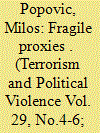

|
|
|
|
|
| Summary/Abstract |
Foreign governments frequently intervene in armed conflicts by sponsoring rebels against their adversaries. A sponsorship is less costly than a direct military intervention, but rebels often defy orders, desert fighting, or turn guns against their sponsors. Under what conditions do rebels defect against their sponsors? Drawing on organizational theory, I argue that as rebel organizations become less centralized and formalized, the rebels are likely to defect against their sponsors. This occurs because non-centralized organizations have weak central leadership and allow for dispersed decision-making, both of which narrow the manipulative capacity of sponsors. Due to these disadvantages, non-centralized rebel movements are less accountable to their sponsors, cannot credibly commit to rapidly change their policies in response to changes in the sponsor’s demands, and suffer from frequent and destructive quarrels between the top and lower echelons. Using multilevel logistic models for panel data, I test my argument on a novel dataset. My quantitative analysis shows that rebel structure is a robust predictor of defection.
|
|
|
|
|
|
|
|
|
|
|
|
|
|
|
|
| 15 |
ID:
195987


|
|
|
|
|
| Summary/Abstract |
Environmental changes place severe pressure on individuals and societies. Vulnerable segments of the population, especially children, are likely to be first affected. We examine the impact of climate variability on the recruitment of children by rebel groups during conflict. We argue that changes in climate patterns increase both the supply of children willing to work as soldiers and rebel groups’ demand for them. To empirically examine this association, we combine global data on temperature and precipitation shocks with information on child soldier recruitment by rebel groups. Our findings suggest that climate variability shapes child soldier recruitment in systematic and significant ways. Additionally, we show that this relationship is not gender-neutral: it has a strong impact on the level of girls recruited by rebel groups. This research has important implications for our understanding of how climate variability can influence conflict dynamics, how environmental changes may worsen the circumstances of the most vulnerable individuals of conflict-affected societies, and how a non-gender-neutral effect of climate change may materialize.
|
|
|
|
|
|
|
|
|
|
|
|
|
|
|
|
| 16 |
ID:
186100
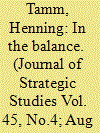

|
|
|
|
|
| Summary/Abstract |
The two main rebel groups in the Second Congo War (1998–2003) evolved in remarkably different ways. While the MLC maintained organisational cohesion throughout the war, the RCD split into two rival groups within less than a year. The larger of these rivals then remained cohesive, whereas the smaller group experienced further fragmentation. This article draws on interviews with key protagonists to show that these cross-group differences resulted from different patterns of state sponsorship. Fragmentation occurred when the intra-group distribution of power between a rebel leader and an internal rival hung in the balance because external troops supported both sides.
|
|
|
|
|
|
|
|
|
|
|
|
|
|
|
|
| 17 |
ID:
155200
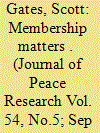

|
|
|
|
|
| Summary/Abstract |
Unable to attract enough voluntary recruits, many rebel groups rely on force to fill their ranks. Given that the group used force to compel individuals to join, a coerced conscript would be presumed unlikely to be loyal and would be expected to desert at the first opportunity. Yet, groups that have relied on coerced recruitment retain their members just as well as, if not better than, rebel armies that rely on voluntary methods of recruitment. This is a puzzle. How do rebel groups maintain allegiance and prevent desertion, especially if they rely on abduction to staff their ranks? A recruit can be forced to join a rebel group, but continuing to rely on coercion to enforce retention is too costly and not sustainable. These groups must find a way to reduce the costs of retention. The solution to this puzzle rests in the mechanisms of socialization that shape the allegiance of forcibly recruited soldiers. Socialization mechanisms are traced through three outcomes: compliance (or Type 0 socialization), role learning (Type I socialization), and norm internalization (Type II socialization). Integrating socialization theory and a rational choice analysis demonstrates that mechanisms that alter preferences through Type II socialization are effective in retaining recruits; the highest level of retention occurs when several mechanisms work in concert. Illustrative case studies of the Lord’s Resistance Army from Uganda, the Revolutionary United Front in Sierra Leone, the Maoists in Nepal, and the Liberians United for Reconciliation and Democracy (LURD) show that a reliance on child soldiers, group assets (pecuniary and non-pecuniary), organizational structure, and the nature of military contestation shape when different mechanisms are effective or not.
|
|
|
|
|
|
|
|
|
|
|
|
|
|
|
|
| 18 |
ID:
139449
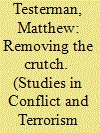

|
|
|
|
|
| Summary/Abstract |
Empirical analysis of civil wars wherein rebels receive support from outside states or actors confirms the expectation that such external support is correlated with conflicts that, on average, are longer than civil wars without external support. When this assistance is lost, the empirical results are at odds with the expectation that these wars should end more rapidly. Instead, wars in which there is a break in external support are more likely to continue into the next calendar year than even those wars with continued external support. This counterintuitive finding suggests a re-evaluation of theoretical foundations of external support to rebel groups.
|
|
|
|
|
|
|
|
|
|
|
|
|
|
|
|
| 19 |
ID:
168998
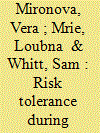

|
|
|
|
|
| Summary/Abstract |
When war breaks out, how important are risk preferences to explaining why some individuals stay in conflict zones while others take flight? We examine risk tolerance among rebel combatants and civilians in Aleppo, Syria using a variation of the Eckel-Grossman Choice Game. Field work in Syria was conducted in 2013–14 with a total of 232 participants to include both Syrian civilians and active rebel fighters in Aleppo and Idlib Province, as well as among Syrian refugees in neighboring Turkey. Compared to Syrians in other locations, people in rebel-held territory of Aleppo, both combatants and non-combatants, are significantly more risk tolerant. We consider possible explanations for elevated risk preferences in Aleppo based on self-selection, adaptive learning, a sense of self-efficacy to affect future outcomes, conflict-related grievances, and in-group solidarity. Our analysis suggests that self-selection based on access to resources and a strong sense of self-efficacy may explain higher propensity for risk-taking. Overall, our results speak to a plausible sorting mechanism during conflict where risk averse individuals select out of conflict, while highly risk tolerant individuals are more prone to discount the inherent dangers of remaining in conflict zones. Our results provide new micro-level explanation for why some societies become mired in conflict traps involving highly risk tolerant fighting communities.
|
|
|
|
|
|
|
|
|
|
|
|
|
|
|
|
| 20 |
ID:
151113
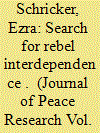

|
|
|
|
|
| Summary/Abstract |
The existing conflict literature tends to treat interdependence between rebel groups as a binary category: either groups are allied or unallied, fragmented or unified, interdependent or independent. Yet much of our qualitative knowledge suggests that interdependence is better understood as a matter of degree where certain groups exert a disproportionate influence over their counterparts. The challenge is how to identify the degree of interdependence in practice. As a solution, I conceptualize interdependence as a property of a system of interactions between rebel groups and government forces within and across borders. My approach is to model the entire system of interactions in order to test hypotheses related to the directionality of influence and the potential for military coordination between groups. I demonstrate the utility of this approach by examining the relationship between Pakistan and the two major factions which make up the Taliban organization – the Afghan and Pakistani Taliban. I analyze the triangular system with a vector autoregressive model and monthly time series data on violent actions initiated by each group from January 2008 to February 2013. The substantive findings support much of the received wisdom concerning Pakistan’s disparate relationship to both groups, which is characterized by antagonism with the Pakistani Taliban and collusion with the Afghan Taliban. The results also suggest that the claims of interdependence between the two Taliban groups have been overstated.
|
|
|
|
|
|
|
|
|
|
|
|
|
|
|
|
|
|
|
|
|